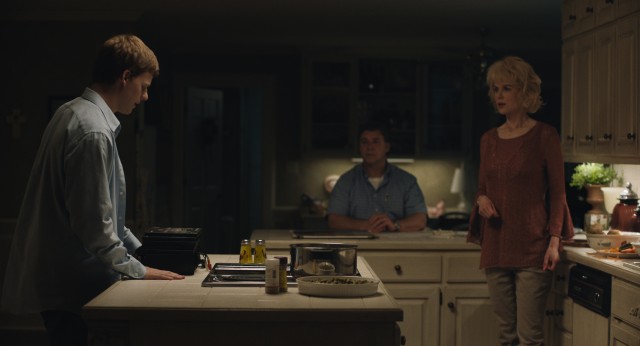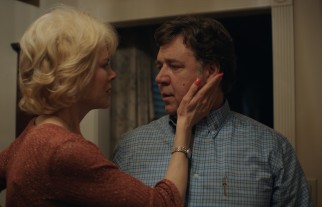Boy Erased Movie Review
 |
Boy Erased
Theatrical Release: November 2, 2018 / Running Time: 114 Minutes / Rating: R Director: Joel Edgerton / Writers: Garrard Conley (memoir); Joel Edgerton (screenplay) Cast: Lucas Hedges (Jared Eamons), Nicole Kidman (Nancy Eamons), Joel Edgerton (Victor Sykes), Russell Crowe (Marshall Eamons), Flea (Brandon), Joe Alwyn (Henry), Xavier Dolan (Jon), Troye Sivan (Gary), Britton Sear (Cameron), Jesse Latourette (Sarah), David Ditmore (Phillip), Devin Rickus (Anders), Matt Burke (Simon), Cherry Jones (Dr. Muldoon) |
The romantic comedy Love, Simon broke new ground earlier this year when it told the story of a teenaged boy coming out as gay to his parents and peers. Based on the memoir of the same name by Garrard Conley, the film centers on Jared Eamons (Lucas Hedges) of Arkansas, who at 18 reveals his same sex attraction to his parents. His father, burly Baptist preacher Marshall (Rusell Crowe), regards homosexuality as a sin. His mother Nancy (Nicole Kidman) mostly remains quiet as Marshall brings in "wiser" men from his church for guidance.
Marshall gives Jared a choice: try to change or be more or less disowned. Not surprisingly, the athletic teen opts for the former and so he is enrolled in a gay conversion therapy program. The movie opens with Jared being admitted into the facility, which resembles other rehabilitation centers on the surface. But it's not addiction or depression these predominantly young males are being treated for. It's same sex attraction.
It doesn't take long for us to see this is every bit as messed up as it sounds. The facility's charismatic leader, Victor Sykes (Joel Edgerton), a man of God with no obvious qualifications, has the patients draw up family trees in which relatives' "sins" are to be noted with abbreviations, like "A" for alcoholic and "Ab" for abortion. Though his poster board is unusually and honestly barren of familial flaws, Jared is earnest about wanting to be treated. But as an intelligent human being, he also seems to have doubts about this being the right path, particularly upon learning that the daily 9 to 5 sessions could be just the start, with some patients extending their treatment for years in nearby housing.
For Jared, Sykes sees a longer term stay with the program as more advantageous than a return to college and its temptations. The viewer, meanwhile, cannot help but wince as this wholesome kid and others are taught that homosexuality is a choice and that they are broken and in need of repair. No matter your views on homosexuality, and as a society we're clearly evolving past the stage where homosexuality warrants "views", the treatment that Jared and the others are subjected will sadden, shock, and outrage you.
While the subject matter does not lend to shades of gray (no one is coming away from this movie thinking that conversation therapy could be right for someone they love), screenwriter/director Edgerton finds ambiguity elsewhere and compels with his depictions. Though they've signed up their son for something terrible, Marshall and Nancy are not evil people. They think they're doing the right thing and, through no one's fault, Jared himself does too.
Society's views are always changing. This is subtly set in the early 2000s and it's fascinating to think just how far we've come even from then in becoming a more tolerant world. But there are varying degrees in everything. Tolerance appears to be in short supply in the setting of the Bible Belt, where Christianity is used and often abused to ostracize those who are different.
Like Spike Lee's BlacKkKlansman, a good movie that nonetheless required us to spend a lot of time amongst hateful racists of the Ku Klux Klan, Boy Erased asks us to endure the fundamentally flawed teachings of a dangerous charlatan. It is often uncomfortable, but as in Lee's movie, there is a point and a value to exposing such narrow-mindedness and we come away the better for it. Edgerton is wise enough not to turn this into an indictment of Christianity or of the South. At all times, it is clear that he just wants to share Conley's story and it is a most moving one whether or not you know one of the 700,000 people that end credits text reveal have been enrolled in such conversion therapy programs (a practice that remains legal, if not terribly common or widespread).
Having made his directing debut on 2015's well-reviewed, commercial successful psychological thriller The Gift that he also wrote, seasoned Australian actor Edgerton shows that he is interested in more emotional fare and capable of presenting such material tastefully and tactfully. It helps that he's rounded up a stellar cast. In the two years since Manchester by the Sea made him a young Oscar nominee, Hedges has quickly turned into one of the reliable voices of his generation. The 21-year-old has a knack for picking projects with substance and heart, As his quite different parents, Crowe and Kidman are both magnetic in their own ways. With Crowe, you feel the weight of a large, intimidating man holding tight to the traditions of an older generation. He wants his son to be the basketball star who dates the cheerleader and one day takes over his Ford dealership and perhaps his congregation. It's an impressive transformation with no echoes of the heroes of Gladiator and L.A. Confidential that he played in his younger, svelter days. Kidman doesn't get to do as much heavy lifting, but she is there to deliver a couple of surprising, effective blows late in the film. And though he's clearly given much of himself to the duties of writing and directing duties, Edgerton saves enough to wow us in his role whose villainy never feels unrealistic.
In a year that has given voice to historically underrepresented demographics, Boy Erased resonates for its authentic portrait of the stress that comes from being a gay person in that transition of awakening between childhood and adulthood. As one of the year's better films, its award prospects may well come down to how moviegoers and my fellow critics receive it. Last year's similarly themed Call Me By Your Name needed only the vociferous support of critics and cineastes to garner multiple Oscar nominations and a Best Adapted Screenplay win. Time will tell if this more personal, less picturesque coming-of-age story generates comparable reactions.
|
Related Reviews:
DVDizzy.com | DVD and Blu-ray Reviews | New and Upcoming DVD & Blu-ray Schedule | Upcoming Cover Art | Search This Site
DVDizzy.com Top Stories:
Now in Theaters: Can You Ever Forgive Me? • Beautiful Boy • Instant Family • First Man • A Star Is Born
Lucas Hedges: Manchester by the Sea • Lady Bird • Three Billboards Outside Ebbing, Missouri
Nicole Kidman: The Killing of a Sacred Deer • Lion • Australia • Margot at the Wedding
Russell Crowe: The Nice Guys • The Insider | Joel Edgerton: Loving • Animal Kingdom • The Great Gatsby • Zero Dark Thirty
Call Me By Your Name • One Flew Over the Cuckoo's Nest
Text copyright 2018 DVDizzy.com. Images copyright 2018 Focus Features, Universal Pictures, Perfect World Pictures, Blue-Tongue Film, and Anonymous Content.
Unauthorized reproduction prohibited.


